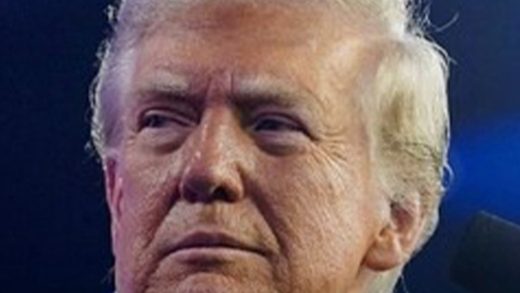The Canadian government won’t say if it is reviewing the Trump administration’s unusual deal with Canadian-based Lithium Americas, despite recent efforts to exclude foreign state-owned companies from the domestic critical minerals sector.
On Tuesday, the U.S. Department of Energy (DOE) announced it had reached an agreement with Lithium Americas, the Vancouver-based company that is developing one of the world’s largest lithium mines in Nevada.
The deal will see the DOE take a five per cent equity stake in the miner and the same percentage stake in Nevada’s Thacker Pass lithium mining project, a joint venture with General Motors. The deal comes after administration officials renegotiated the terms of a $2.26 billion government loan for the mining project, which the U.S. considers a vital way to reduce its reliance on China for lithium, a critical mineral used in the production of batteries for electronics such as cellphones and electric vehicles.

But it’s believed to be one of the first, if not the first, examples of a U.S. Government entity purchasing a stake in a Canadian company — raising questions about economic independence at a time when a strained bilateral relationship has manifested in repeated jibes about the U.S.’s annexation of Canada.
But Lithium Americas proves an interesting case study, for while it is a Canadian company, its main project, Thacker Pass, is based in the U.S., along with its asset, the largest lithium deposit in the country.
Regardless, industry experts believe it’s an “unprecedented” move from the Trump administration, and that it should be on Prime Minister Mark Carney’s radar, while others say the stake is too small to warrant intervention from the Canadian government and the political blowback that would likely come with it.
“We never thought in the past that we would have to be focused on the possibility of the U.S. government … buying into the Canadian critical mineral sector,” says Lawrence Herman, an international lawyer with Herman & Associates.
“We have to be concerned.”

In 2022, Canada’s then Innovation minister, François-Philippe Champagne, ordered three Chinese resource companies to divest their interests in Canadian critical mineral firms following a national security review and an announcement that Canada would limit the involvement of foreign state-owned companies in the sector.
But its stance on U.S. involvement in the sector is less clear, as the Trump administration sets about wresting equity holdings in producers of critical minerals to bolster supply chains deemed essential to national security.
In July, the U.S. Department of Defense took a 15 per cent equity stake in MP Materials, a miner of rare earth minerals. The following month, U.S. President Donald Trump announced that his government had acquired a 10 per cent stake in chipmaker Intel Corp.

Canada’s resources have reportedly been on Trump’s mind, too. In February, then prime minister Justin Trudeau was caught in a hot-mic moment saying the president’s “51st state” rhetoric was likely due to his interest in Canada’s critical minerals.

Get breaking National news
For news impacting Canada and around the world, sign up for breaking news alerts delivered directly to you when they happen.
As such, the Canadian government could choose to review the Lithium-Americas deal under the Investment Canada Act, which vets large-scale deals to ensure benefits to the domestic economy, and includes provisions to account for national security concerns.
This would be a fitting scenario for those provisions to be tested, says Herman, given that “we are dealing with what the record shows to be an adversarial trade and geopolitical partner.”
“The acquisition of equity interests by a foreign government, directly or indirectly, is something that has to be reviewed and reviewed carefully to determine whether it crosses the national security threshold,” said Herman, also a senior fellow at the C.D. Howe Institute in Toronto.
“This will be a very important critical decision that the government will have to make.“

But the Liberal government is cautious in signalling its intentions. A spokesperson for Innovation, Science and Economic Development (ISED) declined to answer all questions from Global News on the deal, and instead issued a statement saying it “welcomes foreign direct investment that benefits Canada’s economy.”
“The Investment Canada Act provides for the review of the most significant investments by non-Canadians to evaluate their likely net benefit to the Canadian economy, and for the review of foreign investments of any size for national security concerns,” the statement said.
“As part of this process, reviews of foreign investments in critical minerals will be conducted in the best interests of Canadians.”
The statement concluded by saying that the government would not comment on specific investments due to confidentiality provisions of the act.
A spokesperson for Lithium Americas said the company has “not talked to the Canadian government about our loan or the new terms.”
‘The Trump administration sees Canada as a target’
As part of his tightening of the sector in 2022, Champagne spoke strongly about the fact that critical mineral investments would get “enhanced scrutiny” under the Investment Canada Act.
“While Canada continues to welcome foreign direct investment, we will act decisively when investments threaten our national security and our critical minerals supply chains, both at home and abroad,” he wrote in a statement.
And in March this year, Champagne announced that the government had expanded grounds for conducting national security reviews of foreign investments, adding investments that could undermine Canada’s “economic security” to the Investment Canada Act.
U.S. government officials have made no secret about their desire to compete in the critical minerals sector.

In April, Trump’s Interior Secretary Doug Burgum spoke about the administration’s focus on considering equity stakes in miners and processors of critical minerals to help them compete against China. In a statement on the Lithium Americas deal, U.S. Energy Secretary Chris Wright said the move “helps reduce our dependence on foreign adversaries for critical minerals.”
But experts are split on whether the Lithium Americas deal meets the bar for intervention.
“There had been a concern over the last number of years about state-owned enterprises from … adversarial and aggressive countries like China, Russia and others buying into our critical mineral sector. Now we have the prospect of the United States, through a variety of its agencies, buying into the sector, and that raises flags,” Herman says.
“We cannot ever discount the underlying policy of the United States under Mr. Trump is to weaken Canada so that the U.S. can increasingly take over more and more of our economy. The Trump administration sees Canada as a target.”

On Wednesday, Trump returned to his talk of annexing Canada, after dialing down that rhetoric in recent months.
The president was speaking about his “Golden Dome” missile defence plans in front of military officials in Quantico, near Washington.
“Canada called me a couple of weeks ago, they want to be part of it, to which I said, ‘Well, why don’t you just join our country? You become 51 — become the 51st state — and you get it for free,” Trump said.
And if the government were to consider intervening in the Lithium Americas deal under the Investment Canada Act, any retaliation from the Trump administration would need to be carefully weighed, too — given the tenuous state of the bilateral relationship.

That’s where Sandy Walker, co-chair of the competition and foreign investment review group at Dentons Canada LLP, believes such a review, for a minor stake, might not be in the best interests of the Canadians.
“It would be a fairly big political statement for the Canadian government to say that the U.S. government could not take a stake in a Canadian company whose major project is this project in the U.S.,” Walker tells Global News.
While Walker agrees that the U.S. may no longer be seen as a “like-minded” country to the Canadian government, and that investments from there may be considered with more caution, she says that the stake is so small, and the potential blowback so great, that the Carney government would be unlikely to step in.
“There might be some difficulty with the Canadian government taking the position that the U.S. government’s taking a small minority stake in Lithium Americas would be challenged by the Canadian government as injurious to Canada’s national security,” she says.
The Investment Canada Act, though used rarely, has blocked attempted U.S. deals before.
One of its most high-profile utilizations was in 2008 when the federal government blocked the $1.3-billion sale of the space technology division of Vancouver-based MacDonald, Dettwiler and Associates to a U.S. firm. At the time, then Industry minister Jim Prentice said he was “not satisfied” the sale would be a net benefit for Canada — the first time a foreign takeover was blocked in the act’s 23-year history.





